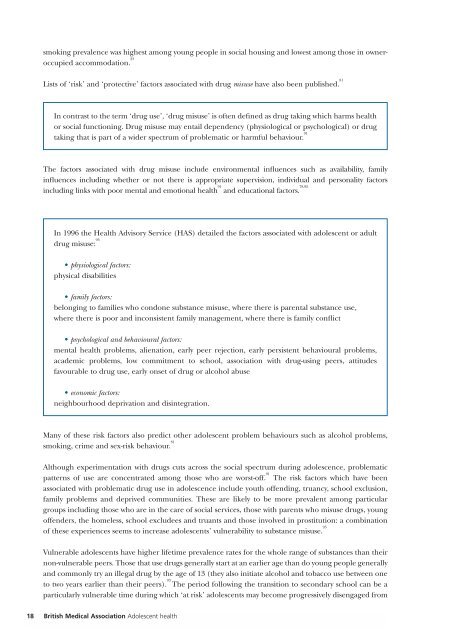Alcohol misuse: tackling the UK epidemic - London
Alcohol misuse: tackling the UK epidemic - London
Alcohol misuse: tackling the UK epidemic - London
You also want an ePaper? Increase the reach of your titles
YUMPU automatically turns print PDFs into web optimized ePapers that Google loves.
18<br />
smoking prevalence was highest among young people in social housing and lowest among those in owneroccupied<br />
accommodation. 23<br />
Lists of ‘risk’ and ‘protective’ factors associated with drug <strong>misuse</strong> have also been published. 81<br />
In contrast to <strong>the</strong> term ‘drug use’, ‘drug <strong>misuse</strong>’ is often defined as drug taking which harms health<br />
or social functioning. Drug <strong>misuse</strong> may entail dependency (physiological or psychological) or drug<br />
taking that is part of a wider spectrum of problematic or harmful behaviour. 91<br />
The factors associated with drug <strong>misuse</strong> include environmental influences such as availability, family<br />
influences including whe<strong>the</strong>r or not <strong>the</strong>re is appropriate supervision, individual and personality factors<br />
including links with poor mental and emotional health 91<br />
and educational factors. 78,92<br />
In 1996 <strong>the</strong> Health Advisory Service (HAS) detailed <strong>the</strong> factors associated with adolescent or adult<br />
drug <strong>misuse</strong>: 93<br />
• physiological factors:<br />
physical disabilities<br />
• family factors:<br />
belonging to families who condone substance <strong>misuse</strong>, where <strong>the</strong>re is parental substance use,<br />
where <strong>the</strong>re is poor and inconsistent family management, where <strong>the</strong>re is family conflict<br />
• psychological and behavioural factors:<br />
mental health problems, alienation, early peer rejection, early persistent behavioural problems,<br />
academic problems, low commitment to school, association with drug-using peers, attitudes<br />
favourable to drug use, early onset of drug or alcohol abuse<br />
• economic factors:<br />
neighbourhood deprivation and disintegration.<br />
Many of <strong>the</strong>se risk factors also predict o<strong>the</strong>r adolescent problem behaviours such as alcohol problems,<br />
smoking, crime and sex-risk behaviour. 81<br />
Although experimentation with drugs cuts across <strong>the</strong> social spectrum during adolescence, problematic<br />
patterns of use are concentrated among those who are worst-off. 91<br />
The risk factors which have been<br />
associated with problematic drug use in adolescence include youth offending, truancy, school exclusion,<br />
family problems and deprived communities. These are likely to be more prevalent among particular<br />
groups including those who are in <strong>the</strong> care of social services, those with parents who <strong>misuse</strong> drugs, young<br />
offenders, <strong>the</strong> homeless, school excludees and truants and those involved in prostitution: a combination<br />
of <strong>the</strong>se experiences seems to increase adolescents’ vulnerability to substance <strong>misuse</strong>. 93<br />
Vulnerable adolescents have higher lifetime prevalence rates for <strong>the</strong> whole range of substances than <strong>the</strong>ir<br />
non-vulnerable peers. Those that use drugs generally start at an earlier age than do young people generally<br />
and commonly try an illegal drug by <strong>the</strong> age of 13 (<strong>the</strong>y also initiate alcohol and tobacco use between one<br />
to two years earlier than <strong>the</strong>ir peers). 93<br />
The period following <strong>the</strong> transition to secondary school can be a<br />
particularly vulnerable time during which ‘at risk’ adolescents may become progressively disengaged from<br />
British Medical Association Adolescent health
















